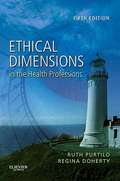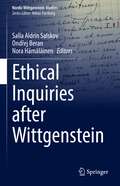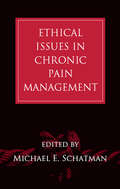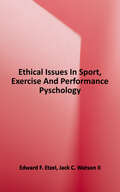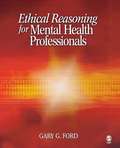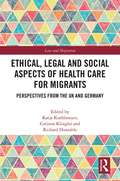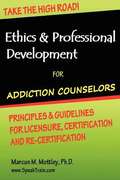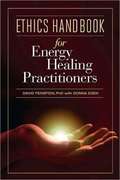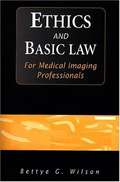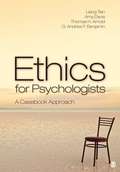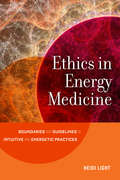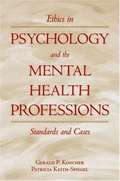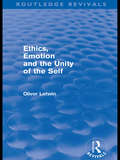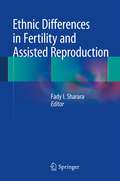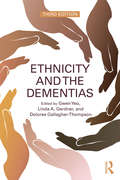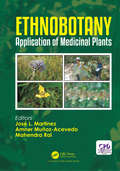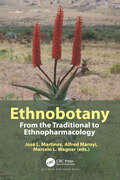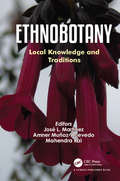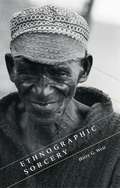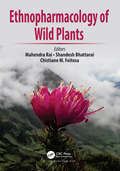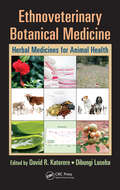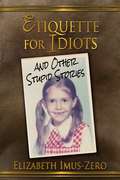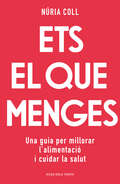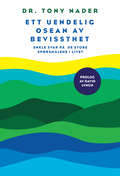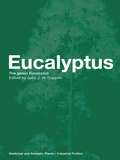- Table View
- List View
Ethical Dimensions in the Health Professions
by Ruth B. Purtilo Regina F. DohertyIdeal for all health care professionals, Ethical Dimensions in the Health Professions, 5th Edition provides a solid foundation in basic ethical theory, the terms and concepts of ethics, and current ethical issues. Expert authors Ruth Purtilo and Regina Doherty outline a unique 6-step decision-making process as a guide to making effective choices that lead to a professional and caring response to patients. They also suggest practical approaches to commonly encountered clinical issues such as confidentiality, informed consent, information sharing, and end-of-life care. With this book, you will develop the skills you need to recognize, understand, and resolve ethical problems.
Ethical Inquiries after Wittgenstein (Nordic Wittgenstein Studies #8)
by Nora Hämäläinen Ondřej Beran Salla Aldrin SalskovThis volume showcases contemporary, ground-up ethical essays in the tradition of Wittgenstein’s broader philosophy and Wittgenstein-inspired ethical reflection. It takes the ethical relevance of Wittgenstein as a substantial and solid starting point for a broad range of ongoing thinking about contemporary ethical issues.The texts are organised in two sections. The first consists of chapters exploring questions around what could be called the “grammar” of our moral forms of life, and thus represents a more traditional approach in ethics after Wittgenstein. The second part represents a recent turn in the tradition towards investigating moral conceptions, perspectives and concepts that are undergoing change, either because the world itself is changing (for instance with new technologies) or because human agency, such as social movements, has brought us to reconsider previously unquestioned ideas and structures.Within the book, the authors’ contributions are inspired, in their ways of working with ethical questions, by Wittgenstein’s conceptions of language, understanding and the nature of philosophical inquiry. This book is of interest to philosophers influenced by Wittgenstein, as well as to all ethicists seeking ideas for how to do philosophy in a manner close to lived experience and practice.
Ethical Issues in Chronic Pain Management (Pain Management Ser. #Vol. 1)
by Michael E. SchatmanSpecifically designed to address the needs of all specialists involved in the care of chronic pain patients, this source clarifies the ethical and legal issues associated with the diagnosis, assessment, and care of patients suffering from long-term pain. Divided into five comprehensive sections, this source covers a variety of topics to help the ch
Ethical Issues in Sport, Exercise, and Performance Psychology
by Edward Etzel Jack C. WatsonThis book focuses attention on the range of unique ethical, legal, and related professional challenges faced by those who work in the areas of sport, exercise, and performance psychology. Ethical Issues in Sport, Exercise, and Performance Psychology is organized into four sections: ethical practices, specific populations, special settings, and academic issues. Professionals in higher education, university counseling centers, sports medicine clinics, and private practice, as well as students, will find this book an informative personal resource.
Ethical Reasoning for Mental Health Professionals
by Gary G. FordThe definition of ethics and how to apply it to the mental health profession.
Ethical, Legal and Social Aspects of Healthcare for Migrants: Perspectives from the UK and Germany (Law and Migration)
by Richard Huxtable Katja Kuehlmeyer Corinna KlinglerNumerous important issues arise in relation to the health of, and healthcare for (and by), migrants. Much commentary on the migrant crisis and healthcare has focused on the allocation of resources, with less discussion of the needs of, and provision for, migrants. Presenting a comparative perspective on the UK and Germany, this volume increases knowledge of a broad spectrum of challenges in healthcare provision for migrants. ‘Migration’ is deliberately understood in its broadest sense and includes not only migrant patients but also migrant healthcare professionals. The book’s content is diverse, with insights from healthcare ethics, healthcare law, along with clinical perspectives as well as perspectives from the social sciences. The collection provides normative reflections on current issues, and presents data from empirical studies. By informing researchers, politicians and healthcare practitioners about approaches to challenges arising in healthcare provision for migrants, the collection seeks to inform the development of adequate and ethically appropriate strategies.
Ethics And Professional Development For Addiction Counselors: Principles, Guidelines And Issues For Training, Licensing, Certification And Re-certification
by Marcus MottleyIn Ethics & Professional Development for Addiction Counselors, Dr. Marcus Mottley defines and clarifies a wide number of ethical issues and dilemmas involving conflicts of interest, boundary issues, confidentiality, professional behaviors and the core obligations, roles and responsibilities of addiction counselors. Addiction professionals who use this book will become highly aware of their own values, attitudes and behaviors and how these might impact their professional conduct and their relationships with clients. Counselors will also gain insights and get clarification on key topics such as documentation, self-disclosure, dual relationships, cultural competence and HIPAA guidelines. Ethics & Professional Development for Addiction Counselors is a concise manual that includes the twelve principles of ethics, eleven principles of professional development and key guidelines, issues and information that are part of the core knowledge requirements for the licensing, certification and re-certification of addiction counselors. Ethics & Professional Development is a precise, no fluff, get-right-to-the-point guide, reference and training manual for counselors, therapists, healthcare professionals and others interested in the field of addictions and the treatment of alcoholism and drug use.
Ethics Handbook For Energy Healing Practitioners
by David FeinsteinEthical principles are far more than mere rules or regulations - they are maps for bringing out your best as a caregiver and healer. Responding to a lack of articulated or standardized ethical guidelines for energy healing practitioners, David Feinstein, PhD, and Donna Eden developed a professional curriculum that has become one of the country's most successful and effective energy medicine certification programs. Now, this comprehensive, case-oriented guide allows veterans of the field and newcomers alike to work through a wide range of ethical dilemmas before they arise, helping you to prevent professional errors that could hurt you, your clients, and your practice.
Ethics and Basic Law for Medical Imaging Professionals
by Bettye G. WilsonComplies with ASRT curriculum guidelines requiring coverage of ethical theory, behavior, and dilemmas; legal responsibilities; and patient consent. Provides coverage of special issues, such as the impaired colleague and special patient populations, including the terminally ill patient and the patient with an infectious disease. Discussion questions facilitate classroom discussion and student analysis. Each chapter includes objectives and an end-of-chapter summary.
Ethics for Psychologists: A Casebook Approach
by Liang Tien Amy Davis Thomas H. Arnold Andrew F. BenjaminEthics for Psychologists provides unique multicultural, moral, and legal perspectives to the standards of conduct in the field of psychology. The book describes complex ethical dilemmas students may encounter and offers a variety of frameworks through which to examine such dilemmas.
Ethics in Energy Medicine: Boundaries and Guidelines for Intuitive and Energetic Practices
by Heidi LightThe first guidebook to discuss the full scope of the intuitive process and propose structures to keep practitioners and clients safeHeidi Light, a family counselor and certified hypnotherapist, asserts that we are in desperate need of guidance and standards so that we can approach the world of intuition, energy, and mysticism from a healthy and respectful place. Drawing from her more than forty years as a medical intuitive, empath, and energy tracker—as well as twenty years as a counselor in private, clinical, and institutional settings—Light offers practical, simple solutions to the alarming lack of boundaries in the fields of intuition and energy medicine. From massage therapists who just throw in a little extra energy work, to psychics who read your sister instead of you, or to practitioners who tell you to take off your clothes, Light shares case studies and vignettes of ethical boundaries mistakenly being crossed. This book explains the traditional psychological model of ethics that counselors and psychologists are taught and outlines an ethical energetics model as a framework for moving through the process of accessing intuitive information and working with energy. Experienced energy workers, those new to the field and just opening to their intuition, and those who come to them for services need to know these ethical guidelines of boundaries and consent.
Ethics in Psychology and the Mental Health Professions: Standards and Cases (3rd edition)
by Patricia Keith-Spiegel Gerald P. KoocherWe seek to present the full range of contemporary ethical issues in the mental health professions, not only as relevant and intriguing but also as integral and unavoidable aspects of the our complex professional roles and social responsibilities. Regardless of one's training speciality or the work setting, critical dilemmas will arise -- probably with some regularity--and we will often need to make challenging decisions or take intervention steps, sometimes right on the spot.
Ethics, Emotion and the Unity of the Self (Routledge Revivals)
by Oliver LetwinThis Routledge Revival reissues Oliver Letwin’s philosophical treatise: Ethics, Emotion and the Unity of the Self, first published in 1987, which concerns the applicability of the artistic classifications of romanticism and classicism to philosophical doctrine. Dr Letwin examines three particular theses associated with philosophical romanticism: that there is within us a high self and a low self; that there is a moral self in inevitable conflict with an amoral self; and that there is a rational self disjoined from and in tension with a passionate self. He argues that these notions of philosophical romanticism are, in fact, radically false, and instead takes the view that man can be a unified being of the sort described by philosophical classicists. But man has to work to achieve this status. The intrinsic unity of the human personality is not a guarantee of a coherent life, but a challenge to be met.
Ethnic Differences in Fertility and Assisted Reproduction
by Fady I. ShararaOver the past 10 years, studies have shown that the rates of fertility vary in different ethnic groups. Ethnic differences also play a significant role in the outcome of assisted reproductive technology (ART) cycles. In the United States, minority groups--African Americans, Hispanics (mainly Mexicans and Central Americans), East Asians (Chinese, Japanese, Koreans, Philippinos) and South Asians (Indians, Pakistanis, and Bengalis)--have significantly lower chances of live births compared to Caucasian women. Birth outcome data collected by the Society for Assisted Reproductive Technology shows a worsening trend in conception rates between the years 1999-2000 and 2004-2006, raising more concern that the disparity in fertility rates between minority groups and white women is widening over time. This comprehensive book serves to answer the questions that arise when managing infertility in a multi-ethnic population. An expert assembly of key leaders in the field of reproductive medicine imparts insight and clinical experience in order to identify and analyze the possible causes of racial disparities in fertility outcome. Some of the reviewed causes include higher Body Mass Index (BMI), tubal diseases, metabolic syndrome, and fibroids in African Americans; tubal disease and higher early pregnancy loss in Hispanics; higher incidence of diminished ovarian reserve and lower BMI in East Asians; and higher incidence of polycystic ovarian disease (PCOS) in South Asians. The book also provides a review of data on access to care and ART services in developing countries. A thoughtful combination of evidence-based medicine and advanced treatment options, this book is sure to distinguish itself as the definitive reference on ethnic differences in assisted reproduction.
Ethnicity and the Dementias (Third Edition)
by Gwen Yeo Linda A. Gerdner Dolores Gallagher-Thompson<p>In recent years, the literature on the topic of ethnic and racial issues in Alzheimer’s disease and other dementias has increased dramatically. At the same time, the need for cultural competence in all of geriatric care, including dementia care, is increasingly being acknowledged. Dementia is a large societal problem affecting all communities, regardless of race or ethnicity, and understanding dementia for specific groups is tremendously important for both clinical knowledge and for health planning as a nation. <p>This third edition of Ethnicity and the Dementias offers invaluable background information in this area, while also examining how those suffering from dementia and their family members respond or adapt to the challenges that follow. Thoroughly updated and revised throughout, the book features contributions from leading clinicians and researchers in the field, with particular attention given to genetic and cultural factors related to dementia, effective prevention and treatment strategies, and issues in caregiving and family support. Chapters offer specific recommendations for dementia care in 11 ethnic/racial groups, as well as suggestions for working effectively with LGBTQ+ families. <p>Providing a truly comprehensive resource on ethnicity and dementia, and including reflections on emerging trends and the future of caregiving, this new edition is ideal reading for clinicians, educators, researchers, policy makers, and families, in search of the most current ethnogeriatric findings.</p>
Ethnobotany: Application of Medicinal Plants
by Mahendra Rai José L. Martinez Amner Muñoz-AcevedoEthnobotany includes the traditional use of plants in different fields like medicine and agriculture. This book incorporates important studies based on ethnobotany of different geographic zones. The book covers medicinaland aromatic plants, ethnopharmacology, bioactive molecules, plants used in cancer, hypertension, disorders of the central nervous system, and also as antipsoriatic, antibacterial, antioxidant, antiurolithiatic. The book will be useful for a diverse group of readers including plant scientists, pharmacologists, clinicians, herbalists, natural therapy experts, chemists, microbiologists, NGOs and those who are interested in traditional therapies.
Ethnobotany: From the Traditional to Ethnopharmacology
by José L. Martinez Alfred Maroyi Marcelo L. WagnerIn this book we present recent studies that have been carried out on some widely used medicinal plants. The need for new and alternative treatments stem from the lack of efficiency of existing remedies for certain illnesses. We have compiled information that may be useful to researchers in their quest to develop new drugs.
Ethnobotany: Local Knowledge and Traditions
by Mahendra Rai Jose L. Martinez Amner Munoz-AcevedoEthnobotany: Local Knowledge and Traditions discusses various plants that have actually been used in traditional medicine for a specific ailment. It desribes the biological effectiveness (activities) related to each "sickness" which have been scientifically verified. This book will also discuss the bioactivities established/determined that are promising and have potential. Finally, this book will be an appropriate consultation tool for scientists/professionals/experts such as ethnobotanists, botanists, cell/molecular biologists, chemists, pharmacists, pharmacologists, environmentalists/ecologists.
Ethnographic Sorcery
by Harry G. WestAccording to the people of the Mueda plateau in northern Mozambique, sorcerers remake the world by asserting the authority of their own imaginative visions of it. While conducting research among these Muedans, anthropologist Harry G. West made a revealing discovery---for many of them, West's efforts to elaborate an ethnographic vision of their world was itself a form of sorcery. In Ethnographic Sorcery, West explores the fascinating issues provoked by this equation. A key theme of West's research into sorcery is that one sorcerer's claims can be challenged or reversed by other sorcerers. After West's attempt to construct a metaphorical interpretation of Muedan assertions that the lions prowling their villages are fabricated by sorcerers is disputed by his Muedan research collaborators, West realized that ethnography and sorcery indeed have much in common. Rather than abandoning ethnography, West draws inspiration from this connection, arguing that anthropologists, along with the people they study, can scarcely avoid interpreting the world they inhabit, and that we are all, inescapably, ethnographic sorcerers.
Ethnopharmacology of Wild Plants
by Mahendra Rai; Shandesh Bhattarai; Chistiane M. FeitosaThe book provides valuable information on wild plants and their ethnopharmacological properties, discussion on ethnobotany, phytotherapy, diversity, chemical and pharmacological properties including antifungal, anti-inflammatory and antiprotozal properties. The chapters include a wide range of case studies, giving updated evidence on importance of wild plant resources from different countries including Nepal, India, Brazil, Chile, Argentina, Colombia, Egypt, Peru, etc. In addition, some specific species are used to explain their potential properties. Discussing traditional usage and pharmacological properties of wild plants, this book is entirely different from other related publications and useful for the researchers working in the areas of conservation biology, botany, ethnobiology, ethnopharmacology, policy making, etc.
Ethnoveterinary Botanical Medicine: Herbal Medicines for Animal Health
by David R. Katerere Dibungi LusebaDespite the undoubted success of a scientific approach to pharmaceuticals, the last few decades have witnessed a spectacular rise in interest in herbal medicinal products. This general interest has been followed by increasing scientific and commercial attention that led to the coining of the term ethnopharmacology to describe the scientific discipl
Etiquette For Idiots: And Other Stupid Stories
by Elizabeth Imus-ZeroIf your name is Don Imus, then hi Dad! Sorry about the stuff I wrote about you. I know you asked me not to write about you but to instead write about me. I’d like to point out that this book is about me, you just happen to be my father and since you stuck around...some of MY stories include you. Shitty luck, right? Anyway, get over it and toughen up. That’s what you always tell me to do. Besides, most of this book is about idiots and morons and how I think they should behave. So don’t worry, it’s not like I accused you of having sex with the dog or beating the cat with a wire hanger...but if I’m left out of your will, I may write a second book. xo love, your wonderful daughter, Elizabeth If you’re anyone else and you picked up this book because of its catchy title, then it’s because you have terrible manners and you are acting like an idiot, or you know someone who is and you need to buy this book for them. Whatever the deal is, enjoy. xo ez
Ets el que menges: Una guia per millorar l'alimentació i cuidar la salut
by Núria CollLa periodista i divulgadora de temes de salut més reconeguda del nostre país ens explica tot allò que sap sobre nutrició i vida sana. Uneix-te als milers de seguidors de la revolució saludable amb els consells de Núria Coll. Menjar saludable no és difícil, però de vegades ens perdem entre tantes dades i dietes de moda. No cal aprendre cada nou estudi nutricional; probablement ens serviria més aturar-nos i pensar una mica. En aquest llibre de reflexions i consells la periodista especialitzada en alimentació saludable, Núria Coll, amb idees i pensaments basats en el sentit comú, ens proposa un objectiu clar: despertar al lector l'ambició de tenir un criteri propi perquè no depengui del que és que els gurus diuen que cal menjar. Aquest llibre t'empoderarà per trobar el teu propi camí en la teva alimentació. «Quan al 2014 vaig començar en la divulgació de l'alimentació saludable, no tenia gaire coneixements, però en poc temps em vaig adonar que, de manera urgent, havíem d'evitar molts dels pots i paquets que omplen els nostres rebosts. En qüestió de setmanes vaig canviar els meus hàbits alimentaris de forma radical, vaig començar a menjar saludable i vaig aprendre una cosa crucial: l'important no era només què menjar, sinó com.»
Ett uendelig osean av bevissthet
by Dr. Tony NaderEnkle svar på de store spørsmålene i livet. Prolog av David Lynch. «I denne milepælen av en bok, tilbyr Dr. Nader ideer og tanker som kan forandre verden. Han gir solide løsninger på spørsmål som lenge har fascinert og begeistret filosofer og forskere og dekker mangfoldige områder som hensikten med livet, det gode og det onde, hva er bevissthet, har vi frihet? Finnes det lov og orden eller bare kaos i universet? Hvordan kan vi utjevne forskjeller mellom ateisten og den troende, determinisme og frie valg? Hvordan gjøre det beste utav livet, oppfylle ønsker og skape fred og harmoni mellom mennesker og nasjoner? Han tilbyr disse løsningene basert på et enkelt underliggende paradigme som forener sinn, kropp og miljø i et osean av ren Væren, ren Bevissthet. En bok man må lese hvis man søker svar på mysteriene i livet, den absolutte og ultimate sannhet.»David Lynch «Jeg ønsker at alle skal vite hva Bevissthet er og hvordan man kan utvikle det for å kunne utnytte sitt full potensial som individ og som aktiv deltaker sammen med andre.»Dr. Tony Nader
Eucalyptus: The Genus Eucalyptus
by John J. W. CoppenEucalyptus, a genus of over 800 species, is a multiproduct crop par excellence. Not only is it grown for timber, pulp and fuelwood, but, as the Aborigines discovered thousands of years ago, it has numerous medicinal and aromatic properties. Since the first commercial distillation of eucalyptus oil 150 years ago, a vast array of eucalyptus-based pro
